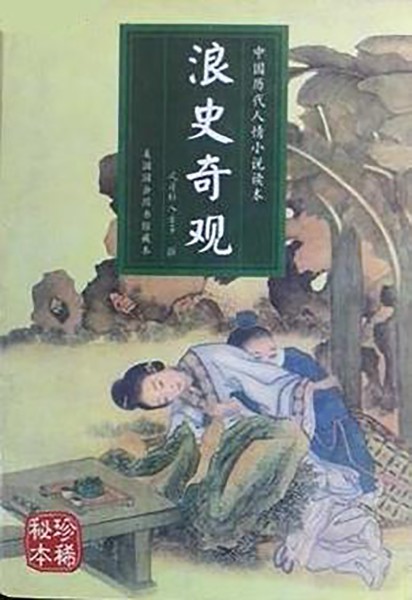

Langshi is a Chinese novel by an anonymous writer, published under a pseudonym during the late Ming dynasty. It’s usually dated between the late 16th and early 17th century (the earliest mentions of the novel that can be found in other books seem to be in 1620).
It’s believed to be one of the oldest erotic novels published in China and follows the bisexual scholar Langzi (浪子) as he seduces a series of male and female lovers in his search for sexual pleasure. His days are filled with poetry and wine and in each of his many homes he has musical instruments, chessboards, calligraphy works and paintings, as well as rock gardens. These homes, the sites of his escapades, are portrayed as heaven on earth.
The novel’s descriptions of sexual acts are both frivolous and fantastical, completely divorced from the social realities of the time. It parodies moral conventions by turning them on their head and suggesting that paradise in the afterlife is not achieved by relinquishing desire but is instead achieved by first realising paradise in this world. And indeed, at the end of the novel after "achieving ultimate sexual gratification", Langzi ascends to heaven and becomes a Taoist immortal. The novel thus suggests that the way to paradise “is achieved by unrestrained sexual gratification. To be restrained in pleasure is human, but an immortal’s pleasure is both eternal and infinite.”
Year of publication:
Estimated 1573-1620
Country of publication:
China
English translation:
Not as far as I can tell
This attitude towards pleasure as something to be enjoyed in life makes Langshi unique in the history of Chinese literature. Unlike Langshi, most novels tried to at least acknowledge public morality in some way, for example by including morally didactic passages to placate the government officials who monitored works of fiction. Langshi’s only acknowledgement of moral norms is their complete reversal and parody.
Some scholars have suggested that the novel also has a more tolerant view of transgressions committed by female characters and advocates for the equality of male and female pleasure. For example, Langzi allows one of his wifes, Li Wenfei, to sleep with one of his male lovers, the bisexual Lu Shu, in exhange for Li Wenfei allowing Langzi to keep a concubine.
In my research, I wasn’t able to find whether this novel has ever been translated to English in full. My summary is based on the article “Karmic Retribution and Moral Didacticism in Erotic Fiction from the Late Ming and Early Qing” and on the Wikipedia entry for Langshi. The full Chinese text is in the public domain and available on the Chinese WikiSource. The Harvard Library also offers a publicly available scan of a centuries old copy. If you’re aware of an English translation or have read the original novel, I would love to hear from you!
